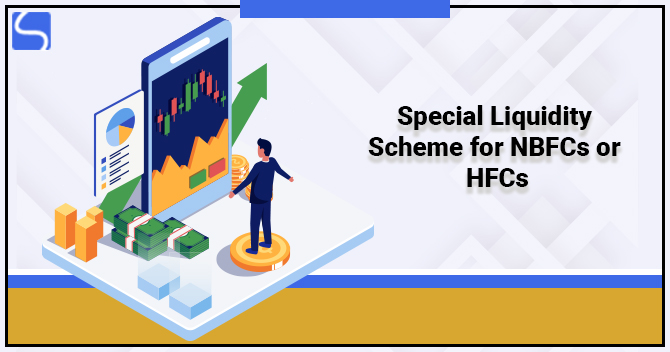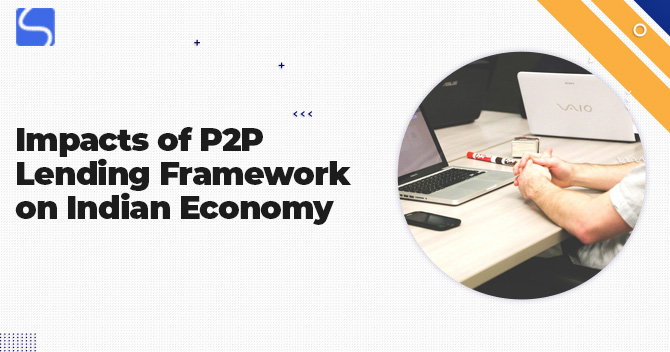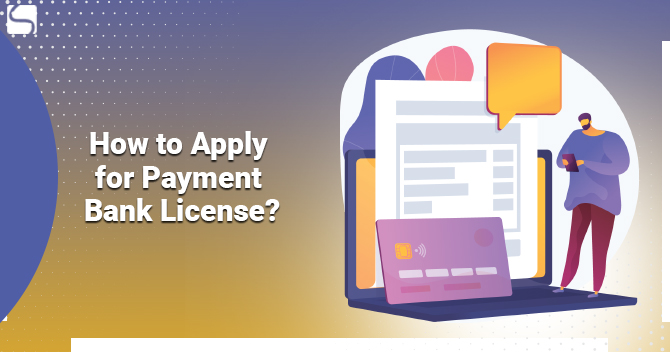What are the Types of Forex Transactions with Related Risks
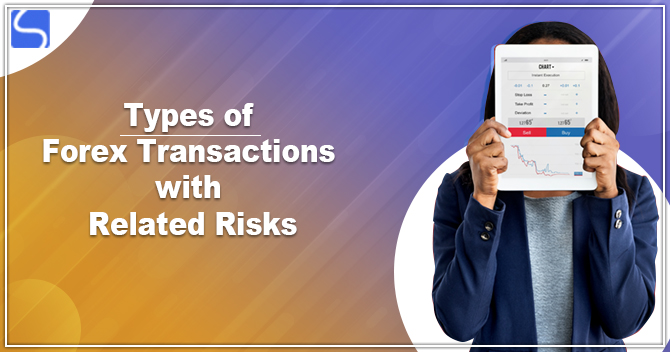
Karan Singh | Updated: Aug 23, 2021 | Category: RBI Advisory
The market of forex transactions is a worldwide digital network where investors & traders buy and sell currencies. It has no physical location and works 24 hours for 5½ days a week. Forex transaction markets are one of the vital financial markets in the globe. Their role is of extreme significance in the system of worldwide payments. To play their role effectively, it is crucial that their dealing or workings be trustworthy. For instance, if two parties have come into a forward contract of a currency pair (it means one is buying & the other is selling), both of them should be keen to honour their side of the contract or agreement as the case may be. In this write-up, we will understand the different types of forex transactions with related risks.
Table of Contents
What is a Forex Transaction?
Before we discuss the different types of forex transactions with related risks, let’s understand the meaning of forex transactions. It refers to the purchase and sale of foreign currencies. It’s an agreement of exchanging a nation’s currency for the currency of another nation at an approved exchange rate on a predefined date. This transaction includes converting the currency of one country to that of the other to settle payments.
Types of Forex Transactions
Following are the different types of forex transactions:
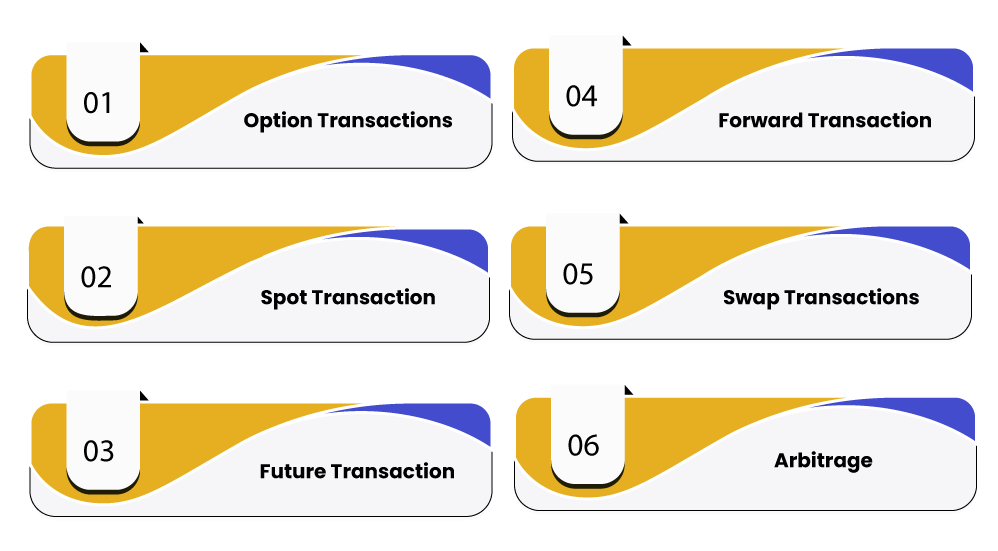
- Option Transactions: An investor acquires the right to exchange the currency in one denomination to another at a fixed exchange rate under this forex transaction.
- Spot Transaction: It is one of the quickest types of forex transactions. In this method, currencies exchange is settled between purchaser and seller within two days of the deal. In the case of spot transactions, the currencies are exchanged at the present rate called as Spot Exchange Rate.
There is a rise in the volume of spot transactions in the forex transaction market. These transactions are majorly in the forms of purchasing and selling of currency notes, cash-in of traveller’s cheque & transfers via banking systems. The last category accounts for approx 90% of all spot transactions are implemented completely for banks. According to the BIS (Bank of International Settlements)[1] calculate, the regular volume of spot transactions is around 50% of all transactions in the forex transaction market.
- Future Transaction: It is similar to forward transactions. But, this transaction is stiff and standardised as compared to the forward transactions in terms of features, date, etc. An opening margin is fixed in this transaction and kept as collateral to set up a future position.
- Forward Transaction: In this case, the purchaser and the seller agree to buy and sell currency after ninety days time of agreement at a fixed exchange rate. These types of transactions take place in the forward market.
- Swap Transactions: Synchronous borrowing and lending of two currencies between two investors come under this transaction.
- Arbitrage: It mentions buying a foreign currency in one market and simultaneously selling it in the other at a higher price, thereby permitting investors to make profits from the difference in the exchange rate existing altogether in different markets. After discussing different types of forex transactions, now examine the risk associated with them.
Forex Transaction Risk – Meaning and its Types
This specifies the chance of losses that may be acquired when trading in foreign currencies due to the variations in currencies. It draws the possibility that the worth of investments can reduce due to the changes in the relative value of the currencies involved. Following are the types of forex transaction risks
- Transaction Risk
When an individual enters into foreign exchange or forex transaction, there is often a time break between agreeing on the transaction terms & executing it to clear up the contract. This interval or break creates a short-term susceptibility to currency risk, which increase from the possible variation in the price of one currency associated with other. Such exchange rate risk, clearly linked with the time delay between entering into a deal & its settlement, is known as transaction risk. The transaction has the capability to cause unforeseen profits and losses.
The more long-lasting the time deal between entering the contract & its settlement, the higher the transaction risk because in such a matter, there would be more time available for the exchange rate to alter.
2. Economic Risk: It is also known as Forecast Risk; it is the risk that the market value of a company is impacted by inevitable exposure to exchange rate variations. Such type of transaction risk is generally created by macroeconomic situations like Government Regulations and/or Geopolitical Instability.
3. Translation Risk: It is also acknowledged as Translation Exposure. It refers to the risk faced by a company headquartered nationally but conducting business in an overseas jurisdiction, and of which the company’s financial performance is denoted in their domestic currency. This risk is higher when an entity or a company holds a greater portion of their assets, liabilities, or equities in an overseas currency.
How to Tackle Transaction Risks?
Following are some strategies that should be adopted to tackle the transaction risks associated with the different types of forex transaction as we mentioned above:
- Invest in Options: An individual can make an investment in options to decrease the transaction risk. But getting the option, the investor won’t be obligated to implement the deal. For example, the spot rate at the implementation time of the option is encouraging to the investor; in such a case, the investor can execute the transaction in the open market rather than practising the option.
- Undertake Near Time Contracts: Since the risk of a transaction is directly proportional to the time interval between entering the contract and its settlement, a near-time contract must be preferred to minimise risk susceptibility.
- Investing in Forward Contracts: An individual may invest in a forward contract to be implemented at a future date consented by locking a predefined exchange price of the currency.
Conclusion
After discussing the types of forex transactions and risks associated with them, it is clear that risk is basic to every forex transaction. The transaction risk has the capability to cause unexpected profits and losses. But, the risk can be decreased & the investor can get reasonable control over the profits & losses of the trade by following planned approaches & strategies.
Read our article:External Commercial Borrowings Under New Framework – An Overview












